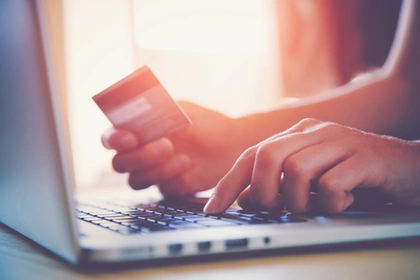Why is my credit card being declined?
Your credit card can be declined for several reasons – and it doesn’t always mean there’s a serious problem. Here are some of the most common causes:
1. You've gone over your credit limit
Every credit card has a spending limit. If you try to spend more than your available balance, your card could be declined to prevent extra charges or unmanageable debt. You can usually check your remaining balance via your app or online banking.
2. The card hasn’t been used in a while
If your card has been inactive for a long time, your provider may block a transaction to protect you from potential fraud. Give your issuer a quick call to reactivate it.
3. You tried to make a large or unusual purchase
A sudden big spend (especially if it’s out of character for you) can trigger a security check. Your provider might block the transaction until you confirm it’s genuine.
4. You’re spending in an unusual location
Buying something abroad or in a different region of the UK? This can sometimes be flagged as suspicious. Most card apps let you notify your lender about travel in advance to avoid issues.
Ocean Credit Card
See if it's a YES before you apply
- Up to £1,500 credit limit
- Checking won't affect your credit score
- Get a response in 60 seconds
39.9% APR
Representative (variable)
Intelligent Lending Ltd (credit broker). Capital One is the exclusive lender.

5. You’ve entered incorrect security details
Typing the wrong PIN too many times or entering incorrect card or CVV (card verification value) numbers when shopping online, can result in your card being declined. Double-check your details before trying again.
6. Your billing address doesn’t match
Online transactions can fail if the name and address you enter don’t match what your card issuer has on file. Make sure your details are up to date.
7. Your card hasn’t been activated
New cards need to be activated before they can be used. Check the activation instructions sent with your card or in your app.
8. Your credit card has expired
Check the expiry date on the front of your card. If it’s out of date, you’ll need to use a new one – most providers will send a replacement before the old credit card runs out.
9. Your card is damaged or faulty
Cards can become worn over time, especially if the chip or contactless strip is scratched. Request a new card if yours no longer works.
10. The main cardholder has cancelled it
If you’re an additional cardholder, the main account holder may have reported the card as lost or stolen, or made changes that affect your access.
Why is my card being declined online when I have money?
If your card works in shops but not online – even when you’ve got money or available credit – there could be a few reasons:
- Security checks failed – Online payments often trigger extra fraud checks. If your card issuer doesn’t recognise the transaction, they might block it. Try verifying your purchase through the banking app or by responding to a security alert.
- Incorrect card details – A simple typo in your card number, expiry date, CVV, or billing address can cause the payment to fail.
- Verification issues – Many online purchases now require 2-step verification (like a text message code or app approval). If this doesn’t go through properly, the payment may be declined.
- Outdated browser or payment system – Some websites need an up-to-date browser or secure payment system. Try updating your device or using a different one.
- The website isn’t secure – Your card provider might block a transaction if the website doesn’t meet certain security standards.
If you're unsure, it's worth calling your card issuer to find out more – especially if the card works everywhere else.
Will my credit score be affected?
It depends why your credit card was declined. If there’s a simple reason, like you’ve used it abroad or the card is faulty, this shouldn’t impact your credit score. But your credit score can be affected if you are at the top of your credit limit (or you go over it).
Avoid maxing out your credit card, or it could give lenders the impression that you’re struggling.
Each lender uses their own criteria when it comes to assessing credit applications. But being at the top of your credit limit could put them off giving you more credit. They want to feel confident that you can afford your repayments.
If you need to borrow, you can apply for a credit card online, but don’t forget that you must stay within the spending limit.
What should I do if my card is declined?
If your credit card is declined, stay calm and try again, in case you’ve made a mistake entering your card or PIN details. Also, check whether your card has expired.
If your card is declined for a second time, get in touch with your card issuer straight away. There is usually a phone number on the back of your card for you to call. Ask your provider why the payment hasn’t gone through. See if they can authorise your transaction there and then.
It could be a case of answering some security questions to authorise the transaction. If you’ve forgotten your PIN number, your card provider will be able to tell you how to reset it.
But if your payment has been rejected because you’ve reached your credit limit, you will need to reduce your balance before you can use it again.
In the meantime, you may need to use an alternative method of payment to complete the purchase.
How to avoid your credit card being declined
To prevent your credit card from being declined in future, there are a number of steps you can take:
- Monitor your statements so you don’t go over your credit limit
- Contact your card issuer to give them a heads up before you make a large purchase or go travelling
- Try to make your PIN easy to remember (but not too easy to guess)
- Keep your name and address details up to date
- Activate your card before you try to use it
- Check the expiry date
- Request replacements for any out-of-date or faulty cards
- Communicate with the primary cardholder so you’re aware of any changes on the account
Disclaimer: We make every effort to ensure content is correct when published. Information on this website doesn't constitute financial advice, and we aren't responsible for the content of any external sites.






